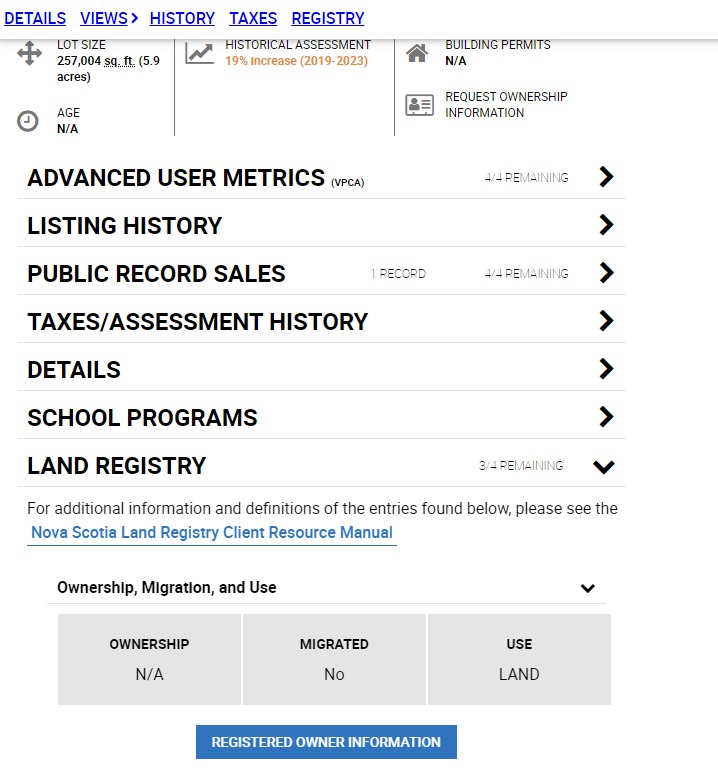Contents
- What is land migration?
- Is my property migrated?
- Do I need to migrate a property to buy/sell?
- Who pays for land migration?
- What are the costs?
- How is land migrated?
- Do I need a lawyer to migrate land?
- How long does it take to migrate land?
- Property migration issues for buyers
- Property migration issues for sellers
- When is the right time to migrate a property?

Property Migration: How to Migrate Land in Nova Scotia
“Is it migrated?”
It’s a question that will come up for any property purchase in Nova Scotia. In this post we’ll cover the basics of migrating land in Nova Scotia, as well as some important reasons why both buyers and sellers should care about whether a property is migrated.
What is land migration?
Call me a cynic, but the root cause of the need for land migration in Nova Scotia is the price of going digital. Instead of funding the entire paper-to-digital conversion for all Nova Scotia properties, the government elected to have property sellers pay for the legal costs on a per-property basis before any property can be sold. It’s essentially the act of recording property information in the Nova Scotia land registry.
Is my property migrated?
It’s easy to check. Enter the PID in a good real estate search site like Viewpoint.ca. Assuming you found the property, click on it for details. In the accordion menu on the details screen, you’ll see a row for “Land Registry”. Click on that sucker. Look in the center column, “MIGRATED” will show a Yes or a No.

The provincial website also points out that you can determine if your land is migrated by contacting the Land Registration Office in your county. I’ll use the web, thanks.
I can’t find any stats on the total percentage of Nova Scotia properties that have been migrated. Many haven’t. Generally, the older the property and the longer it’s remained in the same hands, the less likely it has been migrated.
Do I need to migrate a property to buy/sell?
Yes, very likely. Conversion is mandatory if:
- Ownership changes via a transfer of value
- The lot is subdivided into three or more lots (unless lots are for family transfer)
- You obtain a new mortgage or increase the principal on your existing mortgage.
Who pays for land migration?
The seller typically pays for land migration. In some private sale arrangements, costs may be shared or the buyer may agree to fund the migration cost. (Note: we have a sample Purchase and Sale Agreement for Vacant Land here) In a normal transaction however, the cost is covered by the seller.
What are the costs?
I’ve migrated multiple properties, and the cost is typically around $1,200 CAD. Most websites will quote a range from $800 – 2,000. Some properties may be more complex, but for the most part the process is quite simple. That amount should include the government’s $100 registration fee for converting a property. The lawyers pocket the rest. If you want the full picture of how much it may cost you to sell land, you should also explore our post on Taxes on Land Sales in Nova Scotia.
How is land migrated?
You can explore the full details here, but to put it simply, you contact a Nova Scotia real estate lawyer and share the property details. They will look into the title of the property using the Property Online land registry database and determine if there are any registered interests such as mortgages. (Note: we have detailed info on using the Property Online land registry for a title search). The lawyer will then submit registration paperwork (a document called an AFR) to the Land Registration Office. It includes sections for parcel information (address, PID), registered owner, Qualifications, Opinion & Certificate of Title, and Parcel Description Information. There’s a few checks and notifications that come next, but most of that happens between the lawyer and the Land Registration Office.
Do I need a lawyer to migrate land?
Yes, I believe you do. I’m a big fan of DIY options, but I think only Nova Scotia-authorized lawyers can complete a property migration. Happy to be told otherwise! We’ve compiled a region-by-region list of Nova Scotia real estate lawyers.
How long does it take to migrate land?
About two weeks generally. But wait! Part of the lawyer’s title history search will comb through 40 years of property history. If you have any sort of hiccup in the process this is likely where it will emerge. I have one property that could not be migrated based on the dates of the wills associated with the property. It was lacking “a good root of title” according to the Real Estate Standards. In this case, the land was purchased at tax sale, which means I’m waiting six years from the original purchase of the land. As the Lawyers’ Insurance Association of Nova Scotia describes, “A lawyer may migrate a parcel using a tax deed as the root of title only if six years have passed since the tax deed was registered”. Four more years to go…
What property migration issues should buyers be aware of?
Well, if you’re purchasing land that hasn’t been migrated, there’s a small chance that title issues may surface in the process. It’s rare, but as mentioned above, I’ve had it happen to me first-hand. It’s important to know if a property is migrated, but not as important as our list of Good Questions to Ask When Buying Land.
What property migration issues should sellers be aware of?
First of all, not all migrations are a slam-dunk. If you are arranging a private sale through an agreement, that agreement should stipulate what will happen in the event of migration issue. There’s also the cost – you should know if your property is migrated before you attempt to value it for sale, and factor the migration cost into your asking price so that you’re not taking a surprise hit on your profits.
When is the right time to migrate a property?
If you have no plans to sell a property, you can carry on with unmigrated as long as you like. However, if you plan on selling, it’s best to get it done beforehand.
If you plan on subdividing your lot into multiple properties, you should migrate beforehand. That way you can migrate the full lot for one fee. If not done before your subdivision is approved, each subdivided parcel will need to be migrated separately.
A few notes on my real estate law credentials…
I have none. As always, I’m sharing my information on land migration simply as a guy who’s been down a few roads and learned a thing or two. For any complex situation involving land migration, you’re best bet is a seasoned real estate lawyer to help you through.
For more tips on how to buy land in Nova Scotia, visit our Buyer’s Guide: How to Buy Land in Nova Scotia.
